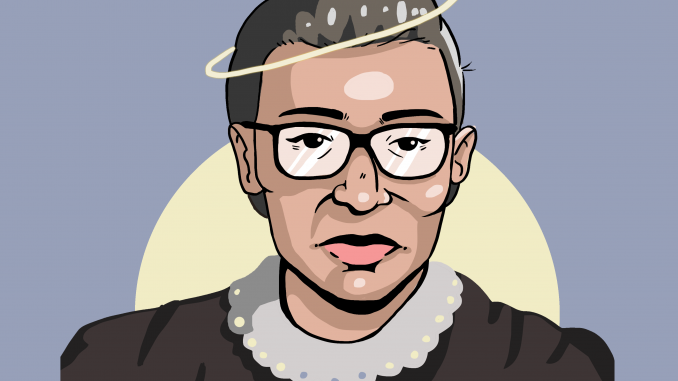
Written by Savannah Cooks, Staff Writer
 On Sept. 18, 2020, the country was struck with a cloud of death. U.S. Supreme Court Justice Ruth Bader Ginsburg passed away in her Washington D.C home after a long battle with cancer.
On Sept. 18, 2020, the country was struck with a cloud of death. U.S. Supreme Court Justice Ruth Bader Ginsburg passed away in her Washington D.C home after a long battle with cancer.
Ginsburg did great things in her lifetime to help communitiesreceive justice. She herself had a taste of injustice. In 1959, when Ginsburg graduated top of her law school class at Columbia Law School in New York, she struggled to f ind work because the doors to law firms were closed to women at that time. She overcame that and worked her way up to become a U.S. Supreme Court Justice.
ind work because the doors to law firms were closed to women at that time. She overcame that and worked her way up to become a U.S. Supreme Court Justice.
RBG was a living icon; she showed love to everyone and wanted to make a better country. Ginsburg’s life not only should be celebrated, but she should also be recognized for the work she did in our country.
RBG is well known for her roll in women’s rights. In 1978, Ginsburg, along with attorney Susan Deller Ross, pushed for the passage of the Pregnancy Discrimination Act. According to eeoc.gov, the act makes it unlawful to discriminate “’because of sex’ or ‘on the basis of sex’ include, but are not limited to, because of or on the basis of pregnancy, childbirth, or related medical conditions; and women affected by a pregnancy, childbirth, or related medical conditions shall be treated the same for all employment-related purposes.”
She also helped pass the Equal Credit Opportunity Act of 1975 which gave women the right to acquire a bank account, credit cards and mortgages without the co-signature of a man. Many of these laws still affect women today.
But she didn’t only fight for women’s rights.
In 1968, Ginsburg represented Charles Mortiz who filed for a tax deduction because he took care of his mother. The IRS denied his deduction because he was a man and unmarried. The U.S court found this unconstitutional and in 1971, the IRS amended section 214 of the IRS code to allow individuals, no matter their gender, to claim tax deduction.
More recently, Ginsburg fought for LGBTQ+ rights. In 1996, Colorado residents passed a state amendment that barred state lawmakers from passing any laws that would protect queer people from discrimination. Lawsuits were filed and the case made it to the U.S. Supreme Court, where Ginsburg joined the majority ruling the amendment unconstitutional.
Ginsburg stated, “the amendment seems inexplicable by anything but animus toward the class that it affects; it lacks a rational relationship to legitimate state interests.”
Ginsburg was also the first Supreme Court Justice to conduct same-sex marriage. In 2015, a law was passed and same-sex couples could be legally married. A case that happened more recently and one of Ginsburg’s final cases is Bostock v. Clayton in 2019. A gay employee was fired after he mentioned he was a part of a “gay softball league”. Bostock sued to seek that sexual orientation and gender identity were protected under the law the same as race and disability. In 2020, the court ruled that gay individuals were protected under the Civil Rights act.
Another community Ginsburg helped bring justice to was the Latino community. In 2012, Ginsburg voted to block an Arizona law that made an undocumented status a state crime, a law that allowed police officers to check the immigration status of anyone in custody before releasing them. The law also made it legal for officers to detain anyone they suspected of undocumented status.
Ginsburg also voted to overturn one of President Trump’s campaign promises. Trump in his campaign stated that he would “immediately terminate” the Deferred Action for Childhood Arrivals (DACA) program. DACA is a program intended to allow undocumented immigrants who were brought to the U.S. as minors to legally remain in the country to study or work. A group of attorneys argued that DACA was created under an unlawful executive order. The court ruled that the government failed to give an adequate reason as to why they should end the DACA program. The court decided to vacate the Trump’s administration order to end the program.
In Ginsburg’s 87 years of life, she accomplished so much. She started with a struggle and turned it into something great. Ginsburg and her influence will be greatly missed by many individuals. Future generations don’t have to honor her to experience what she did when she was alive, but they hopefully get to experience her work. On Sept. 18, the world lost a great soul.
May Ruth Bader Ginsburg rest in peace and may God bless her family.
